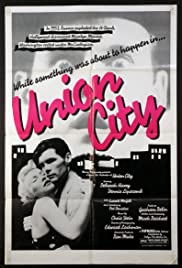
UNION CITY
US, 1980, 81 minutes, Colour.
Dennis Lipscomb, Deborah Harry, Everett Mc Gill, Pat Benatar, Sam McMurray?.
Directed by Michael Reichert.
Union City is an offbeat first feature by writer-director Mark Reichert. It is a brief stylised film from a Cornel Woolrich story called 'The Corpse Next Door'. The story is set in the '50s in New Jersey and colour photography and decor re-create a garish deadened suburbia. The acting is very good indeed, especially by Dennis Lipscomb has Harlan. There is offbeat casting with Blondie's Deborah Harry as Lilian. The film is perhaps more interesting to reflect than to sit through, since it deals with suburban paranoia. As an evocation of this paranoia, boredom, alienation and the deadness of superficial American virtue, the film is well worth seeing.
1. The success of the film as a first feature: its development of plot, opening out of a short story, creation of characters, visual style?
2. The re-creation of the period - garish 1953, New Jersey? New Jersey itself, the streets, the block of apartments, the apartments and their interiors? Decor and costumes? The attention to detail? The visual impact of rooms, shapes, garish colours? The score?
3. The title and the focus on the city and suburbia? The irony of the short story's original title?
4. The introduction to Harlan: the ordinary American citizen, his work, coming home, the encounter with the paper boy. his interests, family life, love for Lilian, relating to her? His age? Meals, going out to drink at the hotel, return home? His focus on the stealing of the milk bottles? The growing obsession? The preparation of devices to trap the thief? The intense and over-serious discussion with Lilian. with his secretary? His being in bed and the elaborate device to trap the thief? His catching him? The thief's taunt about his impotence? His being deceived by Lillian? The violent eruption? The ordinary American husband killing? The elaborate hiding of the corpse and his worry? Cleaning up the blood etc.? The shock in what he had done? The stylised realism of the killing? its symbolic significance?
5. Harlan's growing paranoia? Fear, guilt, self-justification, discussions about becoming a Catholic to confess? The poor relationship with Lilian? Clashes? Going to work and neglecting his work, drinking? The Contessa and his antipathy towards her,' her concern? Larry and his not being suspicious of him but disliking him? The elaborate plans to move but his inability to move, legal and technical complications? Antagonism towards the new couple? The build-up of their examination of the apartment? His fears, cover-up? The irony of the bed being empty? The ugliness of his futile death?
6. The attention to detail of his life, the portrait of an obsessive character and his suspicions? His inability to really communicate? His fear and his opting out of responsibility?
7. The portrait of Lilian - Deborah Harry and her interpretation of the suburban wife? Her dubious background? Domestic sensuality? Her affair with Larry? Her not understanding Harlan? Domestic detail? The discussion about her dyeing her hair? Growing alienation from Harlan? (Her future?)
8. Larry and his ownership of the apartments, managing, the sweaty and singleted man, the affair with the tenant's wife? His reaction to Harlan and the move? His treatment of the new couple?
9. The style of the Contessa and her behaviour, attitude towards Harlan, compassion, reaction to his death? Harlan's secretary and her interest, listening to his devices etc.?
10. The new couple and their examination of the apartment? The atmosphere of suspense - the audience wondering about the discovery of the body?
11. The initial introduction to the thief, his vagrancy, war background, people's disregard of him? His stealing the milk? Taunting Harlan about his marriage? Provoking the violence? The final irony of his watching Harlan lying dead?
12. An insightful short story? The stylised plot and treatment? Insight and observation on the American way of life?